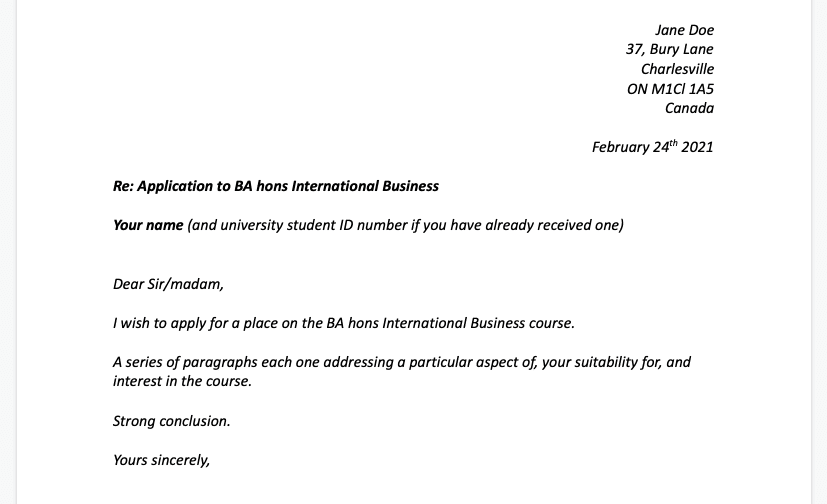Grade 11
Preparing your Motivation Letter…
In this section you can:
- Learn about writing your Motivation Letter from the experts.
- Build a plan that you makes you stay on task.
- Explore the things you must include in your letter.
- Use our checklist to make sure you have covered everything.
- Get answers to your frequently asked questions.
- Find out the things you should NOT do!

The Expert View
Writing a strong motivation letter is critical for success.
Read this to get the complete picture…

Introduction
Most universities require you to produce a piece of writing which addresses your reasons and motivation for applying to a particular course. In the UK this is known as a personal statement, in the United States you’ll need to write a college essay, in the Netherlands (and other countries) you’ll need to write a motivation letter. Irrespective of which country you’re applying to, the motivation letter forms an important part of your application as this is your chance to speak to the admissions tutors and to persuade them to offer you a place
General advice for your motivation letter
The most important thing to keep in mind is to follow the guidelines for the letter of motivation as stated by each university you are applying to. Be sure to consult the program webpage directly for instructions!
There are lots of sample motivation letters on the internet, do not bother reading these, they want to hear your voice, something original from you, not some copy and paste patched together letter.
It may surprise you to learn that it is usually quicker and easier to write your own motivation letter from scratch rather than try and adapt something taken from the internet. Your original work is invariably a better product and will serve your purpose well. If you are still curious about other people’s motivation letters, go and look on the internet, but only after you’ve written your own.
Your letter of motivation should be about one A4 page. Some universities may impose a word limit.
In most cases, you should be able to write one letter and then tweak it slightly to fit each application, provided, that is, that you are applying to similar programs at each university on your list. However, it is up to you to ensure that your letter meets the criteria for each program at each university!
You should include these things in your motivation letter
If you are struggling with ideas for content, it is sometimes a good idea to go back and think about the purpose of your piece of writing. In this case it is to persuade the admissions tutor to offer you a place. So what would he or she like to read about you? The answer is many things. So let’s start brainstorming…
Course Content
A great starting point for you is to go and look at the course content details on the university website. Then focus in on one or two units that you will be studying and talk about how you are particularly interested in expanding your knowledge in those areas. Here you could mention any wider reading that you’ve done, you could also mention that you made a start with studying these topics at school and that you are eager to expand your knowledge.
Perhaps you also have the opportunity to take an elective alongside your major, in this case you can flag this up and say that you found it interesting and that it was one of the main reasons that you are applying to this particular university. Structure your information to reflect the skills and qualities the universities value most – use the course descriptions to help you.
You… international
Many universities are eager to diversify their student body, this means that they are actively looking to recruit foreigners who will bring a new cultural perspective as this is beneficial for their home country students as they will be exposed to new ideas and make new international friendships/contacts for the future. Many countries are eager to recruit talent into the workforce after university. All of this plays in your favor, so you need to mention the following: I’m open-minded, eager to discover and learn about a new country and culture, eager to learn a new language, make new friends. I spent all of my life in international schools surrounded by students from many different countries, I am eager to share that experience with the local students as well as learning from them about (name of country). Remember also to list the languages that you speak.
Stating the obvious: say you have been educated in English since the age of ??? And you would like to continue in English for your university studies.
Internships and work opportunities
If the university offers you the chance to do an internship as part of your course, then mention that this is attractive for you. Some countries allow you to stay on and work after you’ve graduated; you can also mention this as a motivating factor for you.
Your Career Goals
You can talk about how this course will help you to move forward towards your master’s degree and your future career. You do not need to go into career details, but just give a general impression that you know approximately where you are heading. This shows the admissions tutor that you’re a serious student who has mapped out his path.
Aside from the academic, there are many other reasons for choosing a university and you can flag up some or all of these: location (country), size of university, eager to learn a new language, culture of the country, near an airport, climate, extracurricular opportunities, stay in the country after graduation, opportunity to work alongside studies – whatever is important for you.
Extracurricular
Perhaps you have a particular talent or interest, maybe playing in an orchestra or playing sport or maybe you enjoy debate, or you are active in the creative arts. Mention your talents and say how you are eager to pursue them at university.
Lifestyle of the country
This is important as the academic tutors want to know what your motivation is for leaving your home country, which of course also has universities, and moving to a new country. Things to consider here would-be: friendliness of the local people, climate, good infrastructure (public transport, healthcare etc.), work opportunities, world renowned universities etc.
Transferable Skills
Universities are very keen to learn about your transferable skills. These skills could be academic in nature such as writing skills, analytical skills, mathematical skills, presentational skills, language skills etc. Or they could be of a more general nature. You are punctual, reliable, hard-working, a good team player etc.
When listing your activities remember to focus on transferable skills. E.g. if you are a member of a football team then you have used/ acquired/ honed the following skills: teamwork, reliability, punctuality, time management, communication skills etc. It’s all about skills, so whatever activity your list always mention the skills you have used.
Critical Questions
Questions you should ask yourself
question 1:
What is my motivation for the course and the university?
question 3:
Are my parents happy for me to go and study at that university?
question 2:
Can I see myself living in that country?
We’ve looked at what you need to include in your motivation letter, let’s get down to writing it!
Practical first steps
- A good starting point – jot down all the things you feel you might like to include.
- Gather together all your certificates, papers and notes.
- Do not expect to complete either the list or the personal statement quickly.
- Talk to your teachers, parents and friends at university.
Make a good impression
- Don’t repeat information and don’t waffle. Admissions tutors are busy, they won’t appreciate having their time wasted
- Take care with the layout – make it easy on the eye, easy to read, insert breaks between paragraphs
- Take care with your sentence structure and check your spelling and grammar
- Be positive and enthusiastic
- Apply an appropriate style of writing: deal with your topics in a reflective and factual way.
Planning is important
- Start during the summer holiday at the end of grade 11…or earlier.
- Think carefully about why you are applying to university.
- Check course requirements and details.
- Write a first draft and read it over and then share it with your college counselor and ask for feedback. A shared Google doc is always a good idea.
Register
- Your motivation letter should be in formal academic English. Your writing ability will be judged on the quality of the motivation letter.
Action Ideas
Action 1:
Read the university website for guidelines/ requirements re: motivation letters
ACtion 2:
Read the course contents carefully before starting to write
Finished your draft? Use this checklist to see if you have included everything…
Why you are suitable for the course.
Universities like to know the skills you have. Write about these skills and any supporting evidence to back up why you are so excited about the courses you have chosen.
Include details of jobs, placements, work experience, or voluntary work, particularly if it's relevant to your chosen course. Try to link any experience to skills or qualities related to the course.
Tell them what makes you suitable – this could be relevant experience, skills, or achievements you’ve gained from education, work, or other activities.
Mention any relevant employment experience or volunteering you’ve done.
International students can also say why they want to study in that country.
How your IB subjects prepare you for the course that you have chosen. Here you can mention a unit you have studied which was particularly interesting and relevant.
Include any achievements or attributes that make you interesting, special, or unique.
Look at course descriptions and identify the qualities, skills, and experience they require.
Tell the reader why you’re applying – include your ambitions, possible career plans as well as what interests you about the subject.
Include any clubs or societies you belong to – sporting, creative, or musical.
If you took part in a higher education taster course, placement, summer school or something similar, include it.
Things to avoid in your Motivation Letter
Don’t do these!
Do not have a cheesy opening line such as, ‘ever since I was three years old I wanted to be an economist’ this is hardly credible as three year olds have never heard of economics and prefer to focus on playing with their toys and eating!
Do not claim to have done something unless it is true.
Do not claim to have read a book unless you actually have…
you may get caught out at interview.
Wigsbury Frequently asked questions
Quick answers to the important questions
Can I use the same motivation letter for all the universities I’m applying to?
You will need to write a new motivation letter specifically addressed to each university/ course you’re applying to. However, you’ll probably find you’ll be able to re-use much of the content from the first motivation letter in each subsequent letter that you write.
I am suffering from writer’s block. How do I get started?
Go and look at the course content and then start brainstorming ideas about why you like the course and why you are suitable to study that subject. What makes you a good fit.
I am writing a motivation letter for a Dutch University/ Spanish University/ Italian University. Although the course is taught in English, will I be disadvantaged if I can’t speak Dutch/ Spanish/ Italian?
Don’t worry, if the course is taught in English you will not be required to speak the local language, although it’s a good idea to use the opportunity to learn a new language once you are studying there.
If I’m applying to universities in several countries, do I have to mention this in my motivation letter.
No. Just focus on the university you are writing the letter for.
If the university likes what I’ve written, will they interview me?
This depends on the university, mostly not. However, just to be on the safe side make sure you are truthful in your motivation letter because if they did interview you and ask you about something that you haven’t actually done it could all end up being very embarrassing. Just be honest, it is by far the best policy.
I have been reading motivation letters on the internet, there are so many different ideas and now I’m totally confused. What can I do?
In this situation, it’s best to press the reset button and start over from the beginning. A good place to start will be to talk to your college counselor. Then go and have a look at the course content on the university website and start making notes about the things you like about it. This will get you started in a direction which is your own. The university just wants to hear your voice and your reasons for applying.


